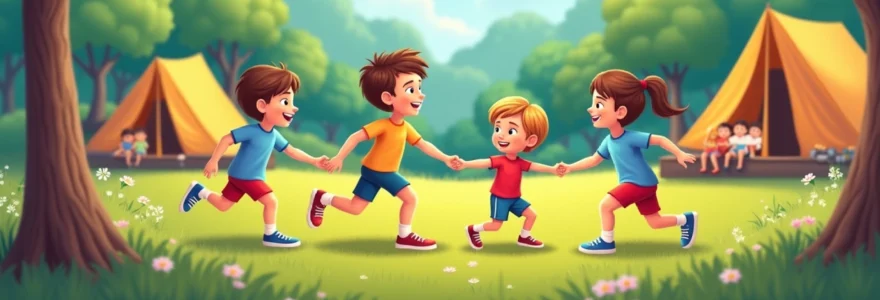Collective holiday stays for children offer a unique blend of adventure, learning, and personal growth. These experiences, often in the form of summer camps or group retreats, provide a rich environment where kids can develop essential life skills while enjoying time away from home. The benefits of such stays extend far beyond mere entertainment, touching on various aspects of a child’s psychological, educational, and physical development.
Psychological development through group dynamics in holiday camps
Holiday camps and group stays create an ideal setting for children to enhance their psychological development. By immersing themselves in a community of peers, kids learn to navigate complex social situations, develop empathy, and build resilience. These experiences often serve as a microcosm of society, allowing children to practice important life skills in a safe and supportive environment.
Social skills enhancement via structured activities
Structured activities in holiday camps provide excellent opportunities for children to enhance their social skills. Through team-building exercises, group projects, and collaborative games, kids learn the importance of cooperation, communication, and compromise. These activities often require children to work together towards common goals, fostering a sense of camaraderie and shared achievement.
For example, a simple activity like building a raft as a team not only teaches practical skills but also encourages children to listen to others’ ideas , express their own thoughts clearly , and find solutions to challenges collectively . Such experiences are invaluable in developing social competence that will serve them well throughout their lives.
Emotional intelligence growth in diverse peer environments
Collective holiday stays expose children to a diverse group of peers, often from different backgrounds and with varied experiences. This diversity creates a rich environment for the growth of emotional intelligence. Children learn to recognize and respect different perspectives, manage their own emotions, and respond empathetically to others’ feelings.
In this setting, kids might encounter situations that challenge their preconceptions or push them out of their comfort zones. For instance, sharing a room with someone from a different culture can broaden a child’s worldview and teach them to appreciate differences. These experiences contribute significantly to the development of empathy , tolerance , and cultural sensitivity .
Conflict resolution techniques in shared living spaces
Living in close quarters with peers during a collective holiday stay inevitably leads to occasional conflicts. However, these situations provide valuable opportunities for children to learn and practice conflict resolution techniques. Under the guidance of trained staff, kids can develop skills in negotiation, compromise, and finding win-win solutions.
For example, a disagreement over the use of shared equipment can become a lesson in fairness and turn-taking. Children learn to express their needs assertively yet respectfully, listen to others’ perspectives, and work towards mutually acceptable solutions. These skills are crucial for maintaining healthy relationships and navigating social situations throughout life.
Educational enrichment beyond traditional classroom settings
Collective holiday stays offer unique educational opportunities that complement and enhance traditional classroom learning. These experiences provide hands-on, immersive learning environments that can spark curiosity, foster creativity, and deepen understanding across various subjects.
Experiential learning through Nature-Based programs
Many holiday camps and group retreats incorporate nature-based programs that provide rich experiential learning opportunities. These programs allow children to engage directly with the natural world, fostering a deeper understanding of environmental concepts and ecological relationships.
For instance, a guided nature walk can transform into an interactive biology lesson. Children might learn to identify local flora and fauna, understand ecosystems, and explore concepts like biodiversity and conservation. This hands-on approach makes abstract scientific concepts tangible and memorable, often igniting a lasting interest in environmental studies.
STEM skill development in outdoor laboratory settings
Collective holiday stays can serve as outdoor laboratories for STEM (Science, Technology, Engineering, and Mathematics) skill development. Many camps offer specialized programs that encourage children to apply scientific principles and mathematical concepts to real-world situations.
For example, a rocket-building workshop combines principles of physics, mathematics, and engineering in an exciting, hands-on project. Children learn about aerodynamics, calculate trajectories, and experiment with different designs. This practical application of STEM concepts not only reinforces classroom learning but also demonstrates the relevance and excitement of scientific inquiry in everyday life.
Cultural immersion and language acquisition opportunities
International or multicultural holiday camps provide unique opportunities for cultural immersion and language acquisition. These experiences allow children to engage with peers from different countries, learn about diverse cultures, and practice foreign languages in authentic settings.
For instance, a language-focused camp might organize cultural nights where children share traditions, foods, and customs from their home countries. This immersive environment accelerates language learning and fosters global awareness and cross-cultural understanding . Such experiences can be transformative, opening children’s minds to the rich diversity of the world and inspiring a lifelong interest in international relations and languages.
Physical health and wellness advantages of active holiday programs
Collective holiday stays often emphasize physical activity and outdoor adventures, providing significant benefits for children’s physical health and overall wellness. These programs encourage active lifestyles, teach important health concepts, and help establish positive habits that can last a lifetime.
Cardiovascular fitness improvement through daily sports activities
Many holiday camps incorporate a wide range of sports and physical activities into their daily schedules. These activities not only provide fun and excitement but also contribute significantly to children’s cardiovascular fitness. Regular participation in sports like swimming, hiking, tennis, or team games can improve heart health, increase stamina, and enhance overall physical endurance.
For example, a typical day at camp might include a morning jog, afternoon team sports, and evening dance sessions. This consistent physical activity helps children build strength, improve flexibility, and boost their cardiovascular health. Moreover, exposure to various sports can help children discover activities they enjoy, encouraging them to maintain an active lifestyle beyond the camp experience.
Nutritional education and balanced meal planning
Collective holiday stays often provide an excellent opportunity for nutritional education and the promotion of healthy eating habits. Many camps employ nutritionists or trained staff to plan balanced meals and educate children about the importance of a healthy diet.
Children might participate in cooking classes where they learn to prepare nutritious meals, understand food groups, and recognize the importance of balanced nutrition. Some camps even maintain gardens where kids can grow their own vegetables, fostering a connection with food sources and encouraging healthier food choices. These experiences can lead to long-term improvements in dietary habits and nutritional awareness.
Sleep hygiene and circadian rhythm regulation in camp settings
The structured environment of a collective holiday stay can significantly contribute to improving children’s sleep habits and regulating their circadian rhythms. Camps often maintain consistent sleep schedules, with set times for lights out and wake-up calls. This regularity can help reset sleep patterns that may have become irregular during school holidays.
Moreover, the abundance of physical activity during the day, combined with reduced screen time, can lead to better sleep quality. Children often report feeling more refreshed and energized after adapting to camp sleep routines. These improved sleep habits can have lasting benefits, contributing to better overall health, improved cognitive function, and enhanced mood regulation.
Independence and Self-Reliance fostering in supervised environments
One of the most significant benefits of collective holiday stays is the opportunity they provide for children to develop independence and self-reliance. While still under the watchful eye of trained staff, children are encouraged to take responsibility for their daily routines, personal belongings, and social interactions.
This supervised independence allows children to practice decision-making skills and learn to solve problems on their own. For instance, they might need to manage their time to complete assigned tasks, choose activities that interest them, or resolve minor conflicts with peers without immediate adult intervention. These experiences build confidence and self-esteem, as children realize their own capabilities and learn to trust their judgment.
Moreover, being away from home and familiar support systems encourages children to develop resilience and adaptability. They learn to cope with homesickness, navigate new social dynamics, and adjust to unfamiliar routines. These skills are invaluable for future life transitions, such as starting college or entering the workforce.
Digital detox and Real-World engagement impact on child development
In today’s digital age, collective holiday stays offer a unique opportunity for children to experience a ‘digital detox’ and engage more fully with the real world around them. Many camps have policies limiting or prohibiting the use of electronic devices, encouraging children to disconnect from screens and connect with their environment and peers.
This break from constant digital stimulation can have profound effects on child development. Without the distraction of smartphones or tablets, children often become more present and engaged in their surroundings. They may discover new interests, develop better face-to-face communication skills, and learn to appreciate the natural world more deeply.
Furthermore, reducing screen time can lead to improvements in attention span, sleep quality, and overall mental well-being. Children often report feeling more relaxed and less anxious when they’re not constantly connected to social media or worried about missing online interactions. This digital detox can help reset habits and provide a fresh perspective on technology use, potentially leading to more balanced and mindful digital consumption in the future.
Long-term social network building and future collaborative skills
Collective holiday stays provide an excellent platform for children to build long-term social networks and develop crucial collaborative skills that will serve them well into adulthood. The intense, shared experiences of camp life often forge strong bonds between participants, creating friendships that can last for years or even a lifetime.
These connections extend beyond the duration of the stay, with many children maintaining contact through social media, reunions, or subsequent camp sessions. This network of friends from diverse backgrounds can be invaluable as children grow, providing support, different perspectives, and potentially even professional connections in the future.
Moreover, the collaborative skills honed during group activities at camp translate directly to future academic and professional settings. Children learn to work effectively in teams, communicate ideas clearly, and appreciate the strengths of diverse group members. They practice leadership skills, learn to delegate tasks, and understand the importance of compromise in achieving shared goals.
For instance, a group project to create a camp performance requires children to assign roles, manage time, resolve creative differences, and work towards a common objective. These experiences mirror the collaborative challenges they’ll face in future workplaces, giving them a head start in developing essential teamwork skills.
The benefits of these social and collaborative skills extend far beyond the camp experience. As children grow into adults, they carry with them the ability to form connections quickly, work effectively with others, and navigate complex social dynamics. These skills are increasingly valued in modern workplaces and can contribute significantly to personal and professional success.
In conclusion, collective holiday stays offer a multitude of benefits for children, fostering psychological growth, educational enrichment, physical health, independence, real-world engagement, and long-term social skills. These experiences provide a unique blend of fun, learning, and personal development that can have lasting positive impacts on a child’s life trajectory.


